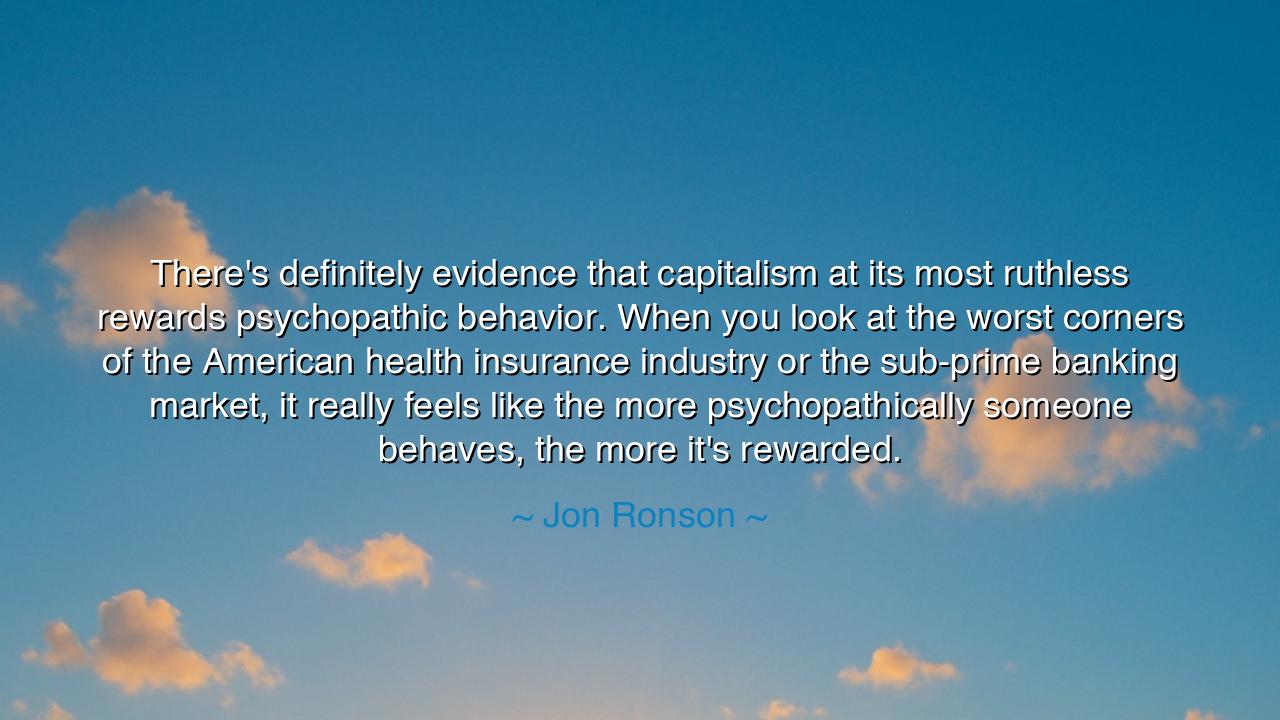
There's definitely evidence that capitalism at its most ruthless
There's definitely evidence that capitalism at its most ruthless rewards psychopathic behavior. When you look at the worst corners of the American health insurance industry or the sub-prime banking market, it really feels like the more psychopathically someone behaves, the more it's rewarded.






“There's definitely evidence that capitalism at its most ruthless rewards psychopathic behavior. When you look at the worst corners of the American health insurance industry or the sub-prime banking market, it really feels like the more psychopathically someone behaves, the more it's rewarded.” Thus spoke Jon Ronson, a seeker of truth and a chronicler of the human psyche, who gazed upon the modern world and saw a troubling reflection — a world where ambition has devoured empathy, and where the machinery of profit sometimes exalts the very traits that strip men of their humanity. His words do not denounce capitalism itself, but rather its corruption, when stripped of conscience and restraint. In that ruthless form, he warns, the marketplace becomes an altar upon which compassion is sacrificed to greed, and the soul of society is quietly sold.
Ronson’s insight arises not from theory, but from his study of the psychopathic mind — a mind cold, calculating, and devoid of remorse. He saw, in his work, that traits admired in boardrooms and trading floors — charm, confidence, decisiveness, and risk-taking — are often reflections of a darker nature when untempered by morality. The ancient philosophers would have recognized this danger well. Plato, in his Republic, spoke of a sickness of the soul — the tyranny that begins when desire overthrows wisdom. When wealth becomes the supreme god, the tyrant within man is awakened, and the virtues of compassion and justice are cast aside as weakness. Thus, Ronson’s warning is ancient in spirit: a society that praises cunning without conscience breeds its own ruin.
Look, then, to the history of the modern age. When the sub-prime mortgage crisis struck in 2008, millions of families were cast out of their homes, not by war or famine, but by the cold decisions of those who saw human lives as numbers on a balance sheet. The architects of that collapse were not monsters in appearance — they were men in suits, polished and educated, who knew exactly what they were doing. Their actions were marked by psychopathic detachment — the ability to inflict suffering without empathy, to exploit without guilt. Yet, instead of being shunned, many of them prospered, protected by the very system they had corrupted. It was as if the gods of commerce themselves had turned their gaze away, ashamed of what mankind had done in their name.
This is not a new pattern, my children. In every age, when wealth becomes the measure of worth, the virtuous are silenced, and the cunning are crowned. The Roman Empire, in its final days, was rich beyond imagination, yet it rotted from within. The strong oppressed the weak, the powerful bathed in luxury while the hungry starved in the streets. The philosopher Seneca, who served in those times, warned his fellow citizens that gold without virtue is a curse — that the man who profits from cruelty is poorer than the beggar who sleeps with a clean conscience. But his voice, like many voices of wisdom, was drowned in the applause of greed. And so Rome fell, not by sword alone, but by moral decay.
Ronson’s words, though spoken in the modern age, carry this same lament. He reminds us that the truest danger of capitalism is not the system itself, but the spirit that drives it. When competition turns savage, when empathy is mocked as weakness, when success is defined by dominance rather than contribution — then civilization drifts toward madness. The psychopath thrives not because society has lost its laws, but because it has lost its heart. And when the heart dies, no amount of wealth can save the body.
But let this not be a cry of despair. For every ruthless profiteer, there exists a soul of light — the healer who works without glory, the teacher who shapes young minds, the worker who labors with integrity though no one watches. These are the true pillars of civilization. And though they may not rise to power, their quiet virtue sustains the world. In their lives, we see the antidote to psychopathic success — the triumph of empathy, fairness, and courage over manipulation and greed. The ancients would have called them “guardians of the good,” the unseen heroes whose hands hold the fabric of society together.
Therefore, O listener, let this be your lesson: do not mistake success for virtue, nor cunning for wisdom. In your work, in your trade, in your pursuit of prosperity, keep your heart awake. Let your ambition serve not only yourself but the greater good. Ask always: Does my gain bring harm? Does my victory leave others in ruin? For the wealth that corrupts the spirit is a chain, not a crown. The world may reward the ruthless for a season, but history remembers the compassionate for eternity.
So remember the wisdom of Jon Ronson, spoken in our time yet echoing through all ages: “At its most ruthless, capitalism rewards psychopathic behavior.” It is not wealth that must be destroyed, but the cruelty that clings to it. Let men and women of conscience reclaim the marketplace, and let compassion once more guide the hand of progress. For when profit walks hand in hand with empathy, and power bows again to morality, only then shall we say that humanity — not greed — has triumphed.






AAdministratorAdministrator
Welcome, honored guests. Please leave a comment, we will respond soon